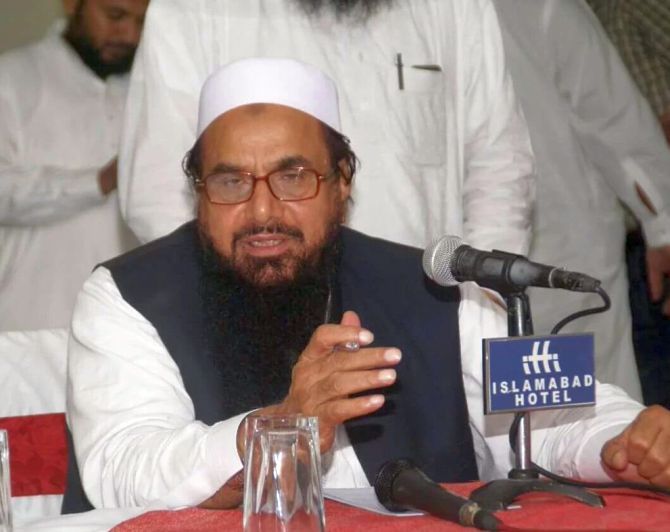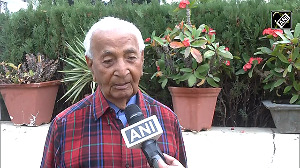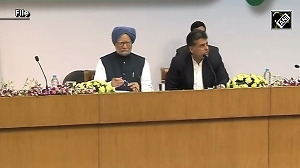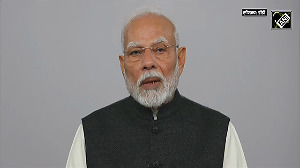This is the first time the Pakistan army has publicly backed the arrest of India-focused jihadis, says Ajai Shukla.

A day after Pakistan's government arrested Muhammad Saeed, the chief of the banned Lashkar-e-Tayiba, along with four associates and issued orders against the Jamaat-ud-Dawa and its humanitarian aid front, the Falah-e-Insaniyet Foundation, the Pakistani street is abuzz with speculation about what motivated this crackdown.
Pakistani government sources discreetly suggest that Saeed was detained to insulate Pakistanis from President Donald Trump's order banning non-US travellers from seven Islamic countries from entering the US, and a follow-up suggestion from his chief of staff, Reince Priebus, that this could be extended to Pakistan.
In contrast, Saeed flatly accused Pakistan of succumbing to Indian pressure.
'This is taking place because of (Prime Minister Narendra) Modi's insistence, Trump's pressure and Pakistan's helplessness,' Saeed stated after his arrest, according to Reuters.
Even so, the Pakistan army's acquiescence would have been essential for such a step. Earlier this month, Business Standard quoted top Pakistan army sources who revealed that the new army chief, General Qamar Javed Bajwa, was readying to curb the LeT and Jaish-e-Mohammed in order to ease tensions with India.
According to Pakistan's Dawn newspaper, the army's public relations chief, Major General Asif Ghafoor, stated at a media briefing on Tuesday: 'This (Saeed's arrest) is a policy decision that the State took in (the) national interest. Lots of institutions will have to do their jobs.'
This was the first time the Pakistan army has publicly backed the arrest of India-focused jihadis, which it has long regarded as 'strategic assets.'
That raises the question has Trump's blockage of Muslim travellers provided the Pakistani army and government with a plausible reason to crack down on Saeed and the LeT, without making it appear like India was being placated?
The action taken against Saeed is stronger than what the Pakistani media has painted.
For years, Saeed operated freely and openly in Pakistan, thumbing his nose at a $10 million bounty that Washington offers for information leading to his arrest, and being the star speaker at public rallies that whip up hatred of India.
Now, unexpectedly, he is detained under Pakistan's stern Anti-Terrorist Act of 1997.
Nor is the LeT chief under 'house arrest' as the media has erroneously noted.
True, Saeed is at home in Lahore, but this has been notified a sub-jail.
He is under full arrest for activities that 'harm peace and security' of Pakistan.
This is significantly different from being arrested for acting again India, or sending militants into Kashmir, all of which are perceived as legitimate activities in Pakistan.
When Saeed was placed under home arrest after the LeT struck Mumbai on 26/11 (2008), the widespread impression across Pakistan that this was at New Delhi's behest ensured the terrorist chief was released within six months.
This time round, there was a markedly different feel to Saeed's arrest.
On Monday, when he was taken into custody from Markaz Al-Qadsia, the JuD headquarters in Lahore, four key associates were simultaneously picked up from across Punjab, reports the credible Pakistani newspaper, The Express Tribune.
Indicating a centrally directed, geographically dispersed crackdown, two associates -- Zafar Iqbal and Abdul Rehman Abid -- were arrested from Markaz Tayyaba, the LeT headquarters at Muridke.
A third, Abdullah Ubaid, was picked up in Faisalabad; while a fourth, Kashif Niazi, was arrested in Multan.
To nobody's surprise, New Delhi has taken a sceptical view of Saeed's arrest.
On Tuesday, the MEA stated: 'We have seen reports on the Pakistan ministry of interior order placing the Jamaat-ud-Dawa and the Falah-e-Insaniyet Foundation under the watchlist and also the notification under which the Falah-e-Insaniyet Foundation has been included in the second schedule of their anti terror legislation under United Nations Security Council Resolution No 1267.'
'Exercises such as yesterday's orders against Hafiz Saeed and others have been carried out by Pakistan in the past also. Only a credible crack down on the mastermind of the Mumbai terrorist attack and terrorist organizations involved in cross border terrorism would be proof of Pakistan’s sincerity,' the MEA said.
Analysts say quiet scepticism from New Delhi would create a better climate for the government of Pakistan to act against jihadi groups than overt triumphalism, or breast beating by the Indian media.
For now, a rampaging Trump has provided the necessary cover.
It remains to be seen whether Indian politicians, in an election season, can display restraint and provide Pakistan with the space to act.
New Delhi sources are now watching carefully for renewed progress in Zaki-ur-Rehman Lakhvi's trial for the Mumbai 26/11 attack.
IMAGE: Despite a US bounty of $10 million for information leading to his capture, Muhammad Saeed, the Lashkar-e-Tayiba terrorist, traveled without restrictions in Pakistan, appearing in public places with impunity.
More insights on the Lashkar-e-Tayiba in the related links below.












 © 2024 Rediff.com -
© 2024 Rediff.com -